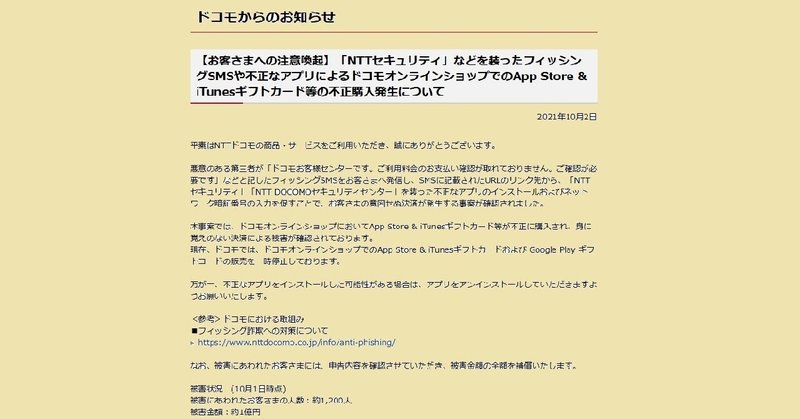
ショートメッセージの功罪
前に、「フィッシングと呼ばれる詐欺について」という記事を投稿しました。その中で、怪しいショートメッセージが私の携帯電話に来たことを書きました。
タイトル写真は、NTTドコモが掲示した、"【お客さまへの注意喚起】「NTTセキュリティ」などを装ったフィッシングSMSや不正なアプリによるドコモオンラインショップでのApp Store & iTunesギフトカード等の不正購入発生について "というお知らせです。
このフィッシングメッセージに騙された被害者は、1200人もいて、その被害約1億円については、NTTドコモが補償するそうです。
しかし、その費用は、ドコモの利用者が毎月払っている利用料から出るわけです。このようなフィッシング詐欺は今後も起きるだろうと思いますが、NTTドコモはその都度補償するのでしょうか。
なぜ企業は、SMSを使うのでしょうか。
”企業 sms”で検索すると、「企業でのSMS(ショートメール)活用メリット」だとか、「SMS(ショートメッセージ)サービスが企業に注目されている理由」だとか、SMSの利用をあおる記事がたくさん見つかります。
また、ショートメッセージの配信サービスを請け負う企業もたくさんあって、一通数円とかの費用で、大量配信できます。
NTT自身も、そのようなサービスを提供しています。
また、いわゆる二段階認証においても、ショートメッセージを使うことが多いと思います。SMSは便利な機能です。
しかし、SMSの大量配信を使うことについて、企業に利点があるのと同様、悪意のある人にも、利点は大きいと思います。
送り先の電話番号を設定すれば、どのような内容でもショートメッセージを送ることができます。
ショートメッセージの受信者は、送信者の電話番号を見ることはできますが、NTTドコモを名乗るフィッシングメッセージに騙された人は、怪しまなかったのでしょう。
NTTドコモは、”SMS拒否設定”という案内を掲示しています。
しかし、この機能は、携帯電話の利用者が設定しないといけません。
もし、SMSを使う設定が最初からオフの状態で、身元が正しいと確認できた場合のみ、ショートメッセージの受信を許可できるようになっていたら、フィッシング詐欺は起きにくくなるのではないかと思います。
私の携帯電話にも、保険会社の営業担当者からショートメッセージが届くことがあります。
私は、ほぼ在宅勤務なのに、その営業担当者が会いたいと言ってくるので、保険会社のサイトの窓口に、今の感染状況を考えて営業活動をしてほしいと投稿しました。
10月9日の朝日新聞に、保険会社の担当者が退職した後、顧客に保険とは全く関係ない勧誘の電子メールを送ってくるという投書が載りました。
先日、保険会社の営業担当者から、「今月末で退職します」と電話があった。丁寧な仕事ぶりや仕事熱心なその姿に感心していたが、その連絡の際、「あなたの電話番号は、自分の携帯に入っているので、何かあったらご相談下さい」と言われ、違和感を持った。私は彼女のお友達ではない。これ以上つきあうつもりもないが、その後彼女から宗教が絡んだようなメールが届いた。保険会社に連絡すると一応謝罪はされたが、「担当者は社員ではなく個人事業主なので、事件でも起こさない限り会社は深くは介入できない」とのこと。退職の際、仕事上の個人情報は悪用しない誓約書は書かせているという。しかし、私は納得していない。個人情報には十分気をつけているつもりだったが、まさかこんなことになるとは。個人情報保護なんて、簡単に破られるものだなとつくづく思った。
そういうことは論外としても、電話番号もメールアドレスも容易に変えられないので、面倒ですが結局は自衛するしかないのでしょう。
The Merits and Demerits of Short Messaging
Earlier, I posted an article about a scam called "phishing". In that article, I wrote about a suspicious short message that came to my cell phone.
The title photo is a notice posted by NTT DoCoMo, "[Alert to Customers] Incidents of Unauthorized Purchases of App Store & iTunes Gift Cards, etc. at DoCoMo Online Shop by Phishing SMS Posing as 'NTT Security' or Other Fraudulent Apps."
There were 1,200 victims who were tricked by this phishing message, and NTT Docomo will compensate them for the damage of about 100 million yen.
However, the cost will come out of the monthly fees paid by Docomo users. I think that such phishing scams will continue to occur, but will NTT DoCoMo compensate each time?
Why do companies use SMS?
If you search for "corporate sms", you will find many articles that stir up the use of SMS, such as "Advantages of using SMS (Short Message Service) in corporations" or "Why SMS (Short Message Service) is attracting attention from corporations".
There are also many companies that offer short message delivery services, and for a few yen per message, you can send a large number of messages.
NTT itself provides such a service.
Also, I think that short messages are often used in so-called two-step verification. SMS is a useful feature.
However, I think the benefits of using SMS mass distribution are as great for malicious people as they are for businesses.
You can send a short message with any content by setting the destination phone number.
Recipients of short messages can see the sender's phone number, but those who were fooled by phishing messages claiming to be NTT DoCoMo would not have been suspicious.
NTT DoCoMo has posted a guide called "SMS rejection setting".
However, this function must be set by the mobile phone user.
If the setting to use SMS is off from the beginning and you can allow the reception of short messages only when you can confirm that you are correct, I think that phishing scams will be less likely to occur.
My cell phone may also receive a short message from an insurance company sales representative.
Even though I work from home, the sales person asks me to meet him, so I posted to the insurance company's website that I would like him to consider the current infection situation and carry out sales activities.
On October 9, the Asahi Shimbun carried a story about an insurance company representative who, after leaving the company, sent e-mails to former customer soliciting her for something completely unrelated to insurance.
The other day, I received a call from a sales representative of an insurance company, who told me that she would be leaving the company at the end of this month.
I was impressed by her politeness and her work ethic, but I felt uncomfortable when she told me, "Your phone number is in my cell phone, so please contact me if you need anything. I am not her friend. I don't intend to hang out with her any more, but then she sent me an e-mail that sounded like it involved religion.
When I contacted the insurance company, they apologized to me, but said that the person in charge was not an employee but a sole proprietor, so the company could not intervene deeply unless there was an incident.
When she resigned from the company, she was told that she had to write a pledge not to misuse customer's personal information in the course of her work.
However, I am not convinced.
I thought I was being very careful with my personal information, but I never expected this to happen.
I really thought that the protection of personal information is something that can be easily breached.
Even though such things are out of the question, phone numbers and email addresses cannot be easily changed, so although it is troublesome, in the end, we must protect ourselves.
この記事が気に入ったらサポートをしてみませんか?
